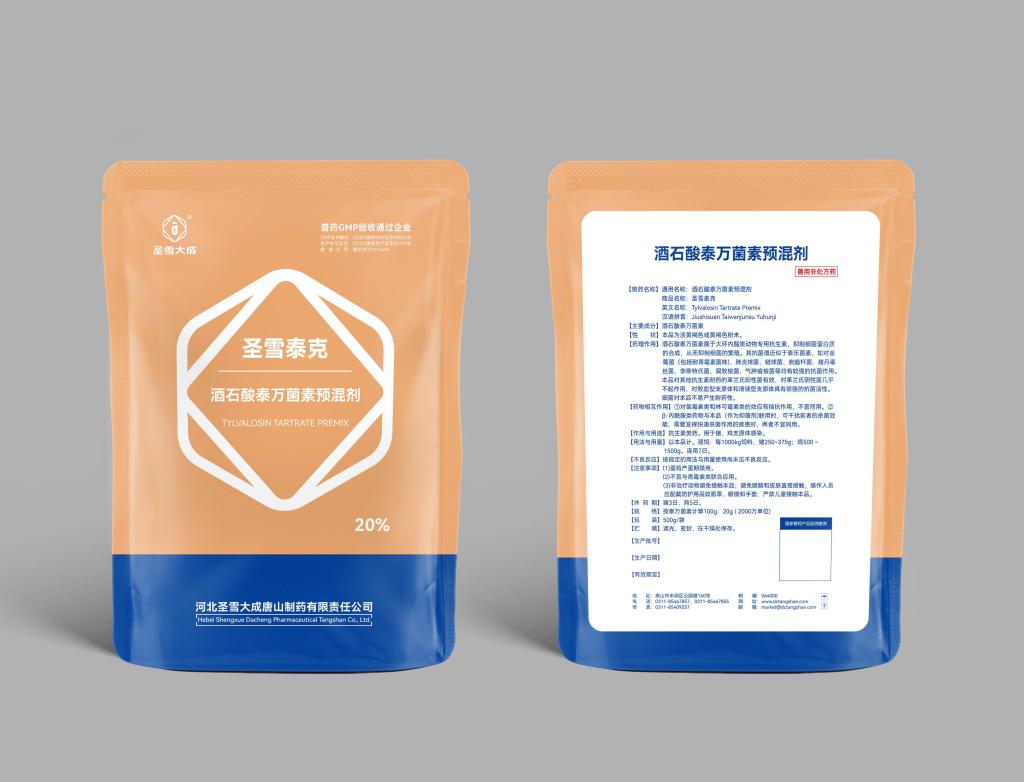
 CONTACT
CONTACT
- Linkman:Linda Yao
- Tel: +8618231198596
- Email:linda.yao@dcpharma.cn
- Linkman:CHARLES.WANG
- Department:Overseas
- Tel: 0086 0311-85537378 0086 0311-85539701
Tylvalosin tartrate premix is vital for intensive farming operations.
TIME:2024-07-11
Tylvalosin tartrate is a macrolide antibiotic used primarily in veterinary medicine. It belongs to the subclass of drugs known as the pleuromutilins, which are effective against a wide range of Gram-positive bacteria, mycoplasmas, and certain Gram-negative bacteria. The premix formulation refers to a ready-to-use mixture of Tylvalosin tartrate with feed ingredients, designed for easy incorporation into animal feed. This formulation ensures precise dosing and uniform distribution within the feed, optimizing its effectiveness in controlling and preventing diseases in livestock.
Benefits of Tylvalosin Tartrate Premix
Disease Prevention: One of the primary benefits of Tylvalosin tartrate premix is its role in preventing diseases in livestock. By controlling bacterial infections such as respiratory diseases and mycoplasmosis, it helps in maintaining animal health and welfare, thereby reducing economic losses due to disease outbreaks.
Improved Growth Performance: Studies have shown that Tylvalosin tartrate can improve growth performance in animals. By reducing the incidence and severity of infections, it allows livestock to allocate more energy towards growth and production, ultimately leading to better feed conversion ratios and higher productivity.
Cost-Effective: In intensive farming operations, efficiency is key. Tylvalosin tartrate premix offers a cost-effective solution by reducing the need for therapeutic treatments and minimizing losses associated with disease-related mortality and morbidity.
Flexibility in Administration: The premix formulation allows for flexibility in administration, as it can be easily incorporated into various types of feed and administered to large numbers of animals simultaneously, ensuring consistent dosing.
Applications in Intensive Farming Operations
Intensive farming operations, characterized by high stocking densities and rapid turnover of livestock, benefit significantly from the use of Tylvalosin tartrate premix. It is commonly used in:
Poultry Farming: In broiler and layer farms, Tylvalosin tartrate helps in preventing respiratory diseases such as chronic respiratory disease (CRD) and infectious sinusitis, which are prevalent in densely populated poultry houses.
Swine Production: Swine are susceptible to respiratory diseases such as porcine respiratory disease complex (PRDC) and mycoplasmal pneumonia. Tylvalosin tartrate premix is effective in controlling these infections, thereby improving growth rates and reducing medication costs.
Aquaculture: In fish and shrimp farming, bacterial infections can cause significant losses. Tylvalosin tartrate premix is used to prevent and treat bacterial diseases, supporting sustainable aquaculture practices.
Regulatory Considerations
The use of Tylvalosin tartrate premix in intensive farming is subject to regulatory oversight in many countries. Regulatory agencies ensure that veterinary pharmaceuticals are safe for animals, consumers, and the environment. This includes evaluating product efficacy, safety, and residue levels in animal products. Compliance with regulatory standards is essential for maintaining consumer confidence and market access for farm products.
Challenges and Considerations
While Tylvalosin tartrate premix offers numerous benefits, its use is not without challenges:
Antibiotic Resistance: Like other antibiotics, the emergence of resistance is a concern. Responsible use practices, including proper dosing and adherence to withdrawal periods, are critical in mitigating this risk.
Environmental Impact: Veterinary pharmaceuticals can enter the environment through excretion and waste disposal practices. Proper waste management and treatment technologies are essential to minimize environmental impact.
Public Perception: Consumer awareness and perceptions of antibiotic use in agriculture influence market demand. Transparent communication and adherence to best practices are necessary to maintain public trust.
Future Directions
The future of Tylvalosin tartrate premix in intensive farming will likely involve continued research into alternative therapies, sustainable use practices, and technological advancements. Innovations in feed formulation and delivery systems may further enhance efficacy and reduce environmental impact.
Conclusion
In conclusion, Tylvalosin tartrate premix plays a vital role in intensive farming operations by preventing diseases, improving growth performance, and enhancing efficiency. While facing regulatory challenges and concerns over antibiotic resistance, its responsible use remains essential for sustainable and productive agriculture. As farming practices evolve, so too will the role of Tylvalosin tartrate premix, ensuring the health and welfare of livestock while meeting global food demands.
- Tel:+8618231198596
- Whatsapp:18231198596
- Chat With Skype







